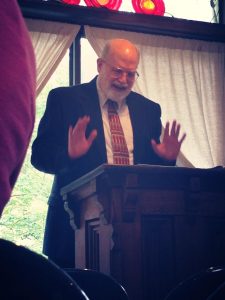A VISIT TO ELIZABETH, Luke 1:39-56
A sermon preached at University Church, Athens, Ga., 10/29/17.
Luke 1:39 Now at this time Mary arose and went in a hurry to the hill country, to a city of Judah, 40 and entered the house of Zacharias and greeted Elizabeth. 41 When Elizabeth heard Mary’s greeting, the baby leaped in her womb; and Elizabeth was filled with the Holy Spirit. 42 And she cried out with a loud voice and said, “Blessed are you among women, and blessed is the fruit of your womb! 43 “And how has it happened to me, that the mother of my Lord would come to me? 44 “For behold, when the sound of your greeting reached my ears, the baby leaped in my womb for joy. 45 “And blessed is she who believed that there would be a fulfillment of what had been spoken to her by the Lord.”
The Magnificat
46 And Mary said: “My soul exalts the Lord, 47 And my spirit has rejoiced in God my Savior. 48 “For He has had regard for the humble state of His bondslave; For behold, from this time on all generations will count me blessed. 49 “For the Mighty One has done great things for me; And holy is His name. 50 “And His mercy is upon generation after generation toward those who fear Him. 51 “He has done mighty deeds with His arm; He has scattered those who were proud in the thoughts of their heart. 52 “He has brought down rulers from their thrones, And has exalted those who were humble. 53 “He has filled the hungry with good things; And sent away the rich empty-handed. 54 “He has given help to Israel His servant, In remembrance of His mercy, 55 As He spoke to our fathers, To Abraham and his descendants forever.” 56 And Mary stayed with her about three months, and then returned to her home.

INTRODUCTION: Just before our passage this morning, Mary had received the most astounding news ever delivered to mortal man or woman: she would be the mother of the Messiah, and, as such, the mother of the incarnate Son of God. If an angel told you something like that, what would you do? You couldn’t sit still; you would have to talk to someone or burst. But who are you going to tell? We have romanticized Mary’s situation to the point that we have forgotten what a hard life she had chosen when she said, “Behold the maidservant of the Lord. Be it so according to your will.” Who is she going to tell? Joseph? Her parents? Can you imagine that conversation? “Uh, Guess what, Mom? Dad? I’m pregnant. I’m going to be an unwed mother—but, not to worry, an angel said it’s OK.” Yeah, right. You and I believe her because we’ve got the whole history of Christ, including His resurrection and His Spirit’s transformation of our lives, behind us. Joseph and Mary’s parents did not. O.K., let’s just put those conversations off a bit. Right now, there is only one person who can be counted on to understand. And so Mary hurries off to visit Aunt Elizabeth. Whether it was to put off telling her parents or because she had told them and they felt a need to get her out of town, Elizabeth is the one person in the world she can really talk to right now. It was a mercy in more ways than one that she got to go.
Now, lots of stuff happened in the three months of that visit that are not recorded. The account we have is in the story because here, at the very outset of His earthly life, even before He was born, it gives three responses to the coming of Christ. There is one by each of the three main characters in this little vignette, one each by John Elizabeth, and Mary. They are here because, taken together, they form a definitive pattern, a practical set of trustworthy signs of Christ’s presence with His followers. Indeed, I will argue, our Lord cannot be present to a receptive and faithful heart without producing these three responses. Is the Lord effectually present in a life? In a congregation? These three signs will tell you, because they are the natural, appropriate, and inevitable responses of a believing heart to who He is. And who He is, is what Luke is at pains to reveal throughout his Gospel. What are they?
JOY
The first is that the infant John the Baptist leaped for joy. This is important. John does it in verse 41, and Elizabeth remarks on it in verse 44. “When Elizabeth heard Mary’s greeting, the baby leaped in her womb; and Elizabeth was filled with the Holy Spirit. . . . . “For behold, when the sound of your greeting reached my ears, the baby leaped in my womb for joy.

Well, what is Joy? Joy is different from Happiness, which is more dependent on circumstances; Jesus was a man of sorrows and acquainted with grief, but those experiences are not incompatible with Joy. Joy is the ability to praise God and rejoice in His love in spite of our circumstances; it is the ability to praise God and rejoice in His love even in the full acknowledgement of the grievousness they sometimes have. So prominent is this response to Christ in both the Gospel narratives and in the Epistles which explain them that its absence in so many contemporary believers and their churches is a troubling and perplexing wonder indeed. To see that, let’s get just a brief survey of those biblical passages.
In Mat. 2:10, the Wise Men saw the star and rejoiced with exceeding great Joy. In Luke 2:10 the angels announced Christ’s birth as news of great Joy to all peoples. The Lord himself said he had come to bring life, and that more abundantly, for the word “Joy” does not have to be present for the concept to be implied. In Mat. 25:21 he promises to say to his faithful servants, “Enter into the Joy of your master.” In John 15:11 he came that his Joy might be in his disciples and their Joy be made full. In Gal. 5:22, the fruit of the Spirit Christ sends as his Representative includes love, Joy, peace, etc. Paul commands the Philippians to “Rejoice in the Lord always, and again I say, ‘Rejoice’” (Phil. 4:4). John writes to us in his first epistle so that our Joy may be made complete (1 John 1:4). Peter speaks in 1 Peter 1:8 of “Joy unspeakable and full of glory.” When the lame man in Acts 3:6 was healed by Christ through his servants Peter and John, he started “walking and leaping and praising God.”
Now, none of us here are lame in body this morning (though I was a little for a while not long ago), but we are all lame and worse in spirit, yea, “dead in trespasses and sins.” Does having our crippled, twisted souls straightened and strengthened into new life not make us leap for joy within? Yes, yes, of course it does—unless we have forgotten what we were like before. No one in the Gospels met Christ without a strong response. No one. It was either bitter anger and hatred, or joy and love inexpressible. If He causes neither in you, then you have not met Him! You have only met a phantom you have created in our own mind to protect you from the shocking and astounding Reality of the Son of God.
Now, what am I doing here? Am I pressuring you to manufacture in yourself a false counterfeit of genuine Christian joy so you can feel better about your spirituality? Go wash your mouth out with soap! If that is what you get out of this, it would be better if I had never spoken. What then am I saying? Don’t try to feel joy (or any other emotion). You will only push the real thing away that way. Rather, choose to focus your attention on those things that we should be joyful about: the beauty of Christ’s person, the elegance of the plan of salvation, the forgiveness of your sins (yes, yours, even yours!), the profundity of God’s love shown by the Sacrifice that gave you that forgiveness. “For God commendeth His love in this, in that while we were yet sinners, Christ died for us” (Rom. 5:8). Do you remember my series on Second and Third John last year? There we learned that Joy is the emotional residue left behind in the psyche by indwelling truth and outworking love, which are the effects and the signs of Christ’s work in your life. Joy is the byproduct of His presence in your life in those ways. Focus on those realities and not on your response to them, and by God’s grace, in time, the response will flow.
BEING FILLED WITH THE HOLY SPIRIT
The first response to the presence of our Lord was that John that Baptist leaped for joy. The second response is that Elizabeth was filled with the Holy Spirit (v.41). This too is the result of responding to Christ with faith. It is related to Joy, which is part of the Fruit of the Spirit, and it is simply a way of talking about the presence of Jesus in your life. We make the doctrine of the fullness of the Spirit too difficult. It really is a meaningful way of talking about the presence of Jesus in your life. For it is He who sends the Holy Spirit. “John answered and said unto them, ‘As for me, I baptize you with water; but One is coming who is mightier than I. . . . He will baptize you with the Holy Spirit’” (Luke 3:16). “But I tell you the truth,” Jesus said, “it is to your advantage that I go away. For if I do not go away, the Helper will not come to you; but if I go, I will send Him to you” (John 16:7). As Christ further explains in what may be the most crucial passage for understanding the Holy Spirit and His work, “But when He, the Spirit of truth, comes, He will guide you into all the truth. . . . He shall glorify me, for He shall take of mine and shall disclose it to you” (Jn. 16:13-14). And what does Peter say in his Pentecost sermon? “Therefore, having been exalted to the right hand of God, and having received from the Father the promise of the Holy Spirit, He [Jesus] has poured forth this which you both see and hear” (Acts 2:33). And, furthermore, Jesus sends the Spirit to each heart which He Himself enters. “If anyone does not have the Spirit of Christ, he does not belong to Him” (Rom. 8:9).

The Spirit’s ministry is to take what belongs to Jesus and reveal it to us, to glorify Jesus, as we saw in John 16:13-14; in other words, it is to make Jesus real to us. The Holy Spirit is the personal Agent and Representative of Christ, sent by Christ to His people to represent Him in their lives between the Ascension and the Second Coming. In the mystery of the Trinity, the Holy Spirit is a stand-in for Jesus who is as good as the real thing—better, actually, in that He can be present with all Christ’s people at once. He is, in other words, the way Jesus is present with all His people even though He is currently located at the right hand of the Father in Heaven, not physically here on earth. Therefore the fullness of the Spirit is not some strange mystical experience in addition to knowing Christ. It simply is knowing Christ. It has no necessary connection to speaking in tongues or any other particular Gift (for the Spirit distributes the Gifts severally as He will) but everything to do with Christ being formed in us. For what we see in these verses is that the Holy Spirit is simply Christ’s personal Representative and Agent who mediates Christ’s presence to His disciples after Christ’s ascension until He returns. The closer to Jesus you are, the more full of the Spirit you will be. To know the fullness of the Spirit, therefore, draw near to Christ.
PRAISE
The third Response is that Mary praised God (vv. 46-55). Mary was probably illiterate, since at that time only boys would have been sent to synagogue school, but she had absorbed the content and the spirit of the Old Testament through a rich oral culture. And so in response to the Spirit in her own heart she spontaneously uttered the Magnificat, one of the most beautiful hymns of praise to Christ ever composed, in which the very style and rhetorical structure of the Psalms is reproduced. Luke’s almost classical Greek becomes suddenly very Hebraic as he quotes it, worthy to take its place in the Psalter alongside the greatest Messianic hymns written by the Sweet Singer of Israel. It continues the theme of Joy (v. 47), for praise is Joy overflowing in expression. As Dr. Orme once said (one of my very favorite of his quotes), “Joy is Peace dancing; Peace is Joy at rest.”

Mary’s hymn praises God for his Grace, in Old Testament terms, to be sure (since the radical form Redemption would take had not yet dawned on her, or anyone else), but Grace unmistakably. Look at verses 48-50: “For He has had regard for the humble state of His bondslave; for behold, from this time on all generations will count me blessed. For the Mighty One has done great things for me; and holy is His name. And His mercy is upon generation after generation toward those who fear Him.” Grace of course is unmerited favor. We see it in Mary being blessed despite her humble state, in God doing great things for her, not as reward for her superlative piety, as some Roman Catholic rhetoric would have us expect, but out of His mercy. Mary sees herself not as some kind of super saint worthy to receive this blessing, but as a recipient of Grace—unmerited favor. In this, she is an example to us. This is an infallible sign of Christ’s presence among a people, that they praise God, and praise Him specifically for his Grace, his unmerited favor—because Christ is its supreme expression.
Mary also praises God for his mighty power (vv. 51f), because this power is used to bring his Grace to bear on the lives of men. “He has done mighty deeds with His arm; He has scattered those who were proud in the thoughts of their heart.” The result is that “He has brought down rulers from their thrones, and has exalted those who were humble.” And she praises Him for His covenant faithfulness, because he has done all of this in accordance with the way “He spoke to our fathers, To Abraham and his descendants forever” (v. 55). Again and again as we follow Jesus through his earthly ministry, we will find that he causes people to give glory to God. This has not changed to this day among those who truly know Him.
PROPER USE OF THE PARADIGM
Now, I want us to put this little vignette to its right use. I want it to be an encouragement to us to respond to Jesus authentically as Elizabeth, John and Mary did. But it may be a discouragement if we are not careful. What we are seeing here is a classic, definitive, perfect, paradigmatic instance of the natural emotional response of redeemed sinners to their faith to Christ. It is crystal clear, and it is pure. But in our own lives, I’m willing to bet the response has never been clear or pure; it has often been anything but clear or pure. It is muddy and mixed and scandalously undependable, to the point that we might, in comparing ourselves to this portrait, become discouraged and wonder if we have met Christ at all. But I think that if those of us who are truly Believers could look at our lives objectively, we would see Joy in the Lord, we would see the fullness and fruit of the Spirit, and we would see that we have praised Him truly if imperfectly on many occasions. The fruit of love, joy, and peace may be green and knotty, it might not be as thick on the boughs as it should, but it is there on the branches in ways that would not be so had Christ not impacted our lives. We should perhaps be encouraged that in vile, wretched, hopeless and inexcusable Sinners like ourselves we can see these signs at all.

Dr. Williams preaching at University Church
Let me give you an example of what I mean. My freshman year in college I was a music major, first chair clarinet in both the concert band and the orchestra at Taylor University as well as taking private lessons. I was practicing more than I ever had in my life, and I was getting powerfully discouraged. “I’ve never practiced harder,” I complained to my teacher, “But I’m only getting worse.” “No you’re not,” he responded. “You are actually improving a lot. But what is happening is that your understanding of where you should be is climbing faster than your ability to get there. The gap between the two is growing, and that is why it feels like you are going backwards. But you are actually making great progress.” He was right. I’ve seen the same thing happening to people in their spiritual walk. Is that an accurate description of where you are? I don’t know, of course. But if you really are serious about following the Lord and are nonetheless discouraged, it very well might be. If you are really serious about following the Lord and not just being a spiritual slacker, I’m inclined to think it probably is. Be encouraged!
Yes, be encouraged. But encouragement is no grounds for complacency. Do what Paul said to do: always be pressing forward to the high calling in Christ Jesus. Why? Because our labor is not in vain in the Lord. When we see Him face to face, these responses of Joy, Fullness, and Praise, in purity and power, will define us completely. And to the extent that we come to know Him and learn to live by faith in Him, we will find them growing in us even now. That is one way to measure whether we are growing. To the extent that we are, our testimony will have credibility, for these things are the definitive evidence of His Presence in our lives–just as when Mary brought Him in embryonic form into the house of Elizabeth, and there was Joy, the Fruit of the Spirit, and the spontaneous Praise of God. May it increasingly be so in our lives.
Here endeth the lesson.
The Rev. Donald T. Williams, PhD, is R. A. Forrest Scholar at Toccoa Falls College and a member of University Church, Athens, Ga. He is the author of ten books, most recently Deeper Magic: The Theological Framework behind the Writings of C. S. Lewis (Baltimore: Square Halo Books, 2016).

The book on Lewis that you need!
Related